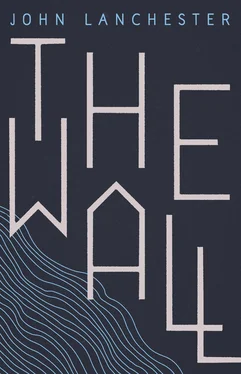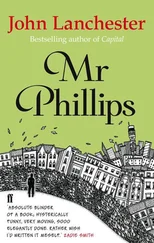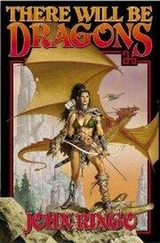Talking to my old mates, I came to realise that life was going to be divided into two, before the Wall and after the Wall. It was as if this thing we had in common was coming between us; the Wall was the same for everybody, but it was different for everybody too. Maybe we’d go back to having our lives in common in two years’ time (or rather in ninety-eight weeks’ time, I’d gone fully over to the Defenders’ habit of counting time not by the calendar but by the number of weeks you’ve put in), but for now, we were friends because of things in the past, not the present. The main lesson I took from my week at home: my Wall company was what I had in my life now, instead of family and friends.
When I left on the return journey, walk bus train another train lorry, I said goodbye to my mother and father at the front door. A shy hug from my mother, and a handshake from my dad. I could see in his eyes that he wanted to say something, dispense some advice, and he could see in mine that I wasn’t having it. I picked up my rucksack and started out but when the door closed, I stopped and waited at the window for a few minutes. It was dark out and they couldn’t see me. The light in the hallway went off, then the light in the sitting room went on, then the television went on, then they started watching the programme they’d clearly been waiting a whole week to watch. I don’t know whether it was a documentary or a film, I didn’t wait to see, but the opening shots showed sand and blue sky and deeper blue water, and small figures climbing up onto boards and riding waves and falling off into the water. My parents had waited for me to leave and then turned on a programme about surfing.
Then it was back to the Wall. The second cycle was harder because our squad switched over and were on the night shift. I had thought the twelve hours of day watch was difficult, but the nights were worse. The dark makes it harder, obviously. The type 2 cold, which is much more likely to come at night, makes it harder too – the cold which is like glue, like mud, which makes it so hard to move it’s as if the Wall’s concrete is still wet. But the real difficulty is because it’s easier to be apprehensive at night. That deep, black part of the brain which by day secretly wonders what it would be like if the Others came, and wonders if it would really be so bad, by night is given over to fear.
At night, on the Wall, imagination is not your friend. The distracting thoughts which help you get through the day – about being somewhere else, about what you’ll do when you get off the Wall, about food, about sex – don’t work as well. You see things and hear things that aren’t there. You know this, and you train for this, but at the same time you know that sometimes, those things are there, and that many times the following has happened: a Defender who thought for a moment he saw something which looked like moonlight gleaming off metal, and dismissed it, or thought he heard something like metal scratching on concrete, and dismissed it, died coughing up blood with an Other’s knife in his guts. You don’t get through a twelve-hour shift without having your adrenaline triggered at least once. You tell yourself to calm down, then you tell yourself that there’s maybe something there after all. Up down up, like taking pills. You never get used to it, and the best you can hope for is that you get used to not getting used to it.
We saw much more of the Captain at night. I know it doesn’t sound possible that the presence of one man can make a difference to a fear that’s as elemental and basic as the kind you get standing guard in the dark against the Others. It did, though. You knew that at some point in your twelve hours, he would be there, appearing either on foot, marching down the ramparts through the pools of illumination, or on a bicycle, which he never did by day, and which always looked slightly incongruous. He was a big man and the bike looked as if it was a size too small for him. Sometimes he would just appear, popping up beside a post without warning, because he had come along the track inside the Wall, the same trick he had used on the first day to catch me daydreaming. (I learned later he did it to everyone on their first day.) He never said much, just stood beside you and looked out at the sea. Then he would make some simple observation, something basic and elemental, about the kind of night it was, dark or less dark, cold or less cold, moonlit or starlit, windy or still, harder to see or less hard, nearly over or just begun. He never told you anything you didn’t already know, but it was always just enough to let you know that he had stood on the Wall many times, far more times than you ever would, and he knew it better than anyone, and he was here with you. Then he would nod a farewell, and go on to the next post. Often, in middle stretches on the Wall, halfway between one post and another, he would just stop and stare out at the sea. It was as if he was stretching out his senses, extending the reach of his hearing and vision, out into the dark.
‘What do you think the Captain is looking for, when he does that?’ I asked Hifa one night. At night we did the same thing we did by day, and met in groups of three for a mid-shift meal. I hadn’t realised that you stayed in your pattern of posts for the whole of your two years on the Wall, meaning you ate with the same three people every day, hundreds of times. If you didn’t get on with your crew, if they were bullies or idiots or silent or coldly hostile, or just if the chemistry was wrong, a twelve-hour shift which was already difficult became even more so.
‘Maybe he thinks his senses are sharper when there’s no one around,’ she said. ‘You know, the small noises people make. Distractions. Body language. Away from it all. Are you going to finish that?’ she asked Shoona, who was making slow progress with that night’s energy bar. It had something very sticky in it, maybe dates. In reply Shoona broke it in half and gave the bottom of the bar to Hifa. She took it without saying anything and started eating it. In any other context it would have seemed outlandishly rude, but on the Wall it was a kind of intimacy.
‘Four tours …’ said Hifa. ‘Imagine doing four tours. Eight years on the Wall.’
‘He was a sergeant by the end of his first tour,’ said Shoona. ‘He just has a knack for it.’
‘Yeah, well, imagine having a knack for it,’ said Hifa. ‘I mean, of all the things you could have a knack for.’
‘Juggling,’ I said.
‘Knitting,’ said Shoona.
‘Sex,’ said Hifa.
‘Sleep,’ I said.
We didn’t say much after that.
I finished my food and my hot drink and got up to go back to my post. At night, even the young and the fit stiffened up quickly, and I could feel how the cold had taken up residence in various parts of my body while I was sitting – my hips, my knees. Hifa and Shoona got up too and we split up. I went to the edge of the illuminated ground around my post, about fifty metres away, and jogged back and forwards to the far edge for a few minutes, getting out of breath and warming up but being careful to stop short of sweating. At one end of my circuit, looking out to sea, I thought I saw something. A glimmer of light, was my first thought, out to sea. It was unlikely to be one of ours: the Guard did go out at night, but when they did, they didn’t often use lights. I thought I must have been imagining it, but a few minutes later there was another glint, and then another.
‘I think I can see lights,’ I said over the communicator. I felt embarrassed and frightened at the same time – embarrassed in case I was imagining things, frightened in case it was Others. ‘Out to sea.’
‘How far out?’ asked the Captain. Having his voice loudly in my ear without preamble made me jump; normally he didn’t use the communicator.
Читать дальше












